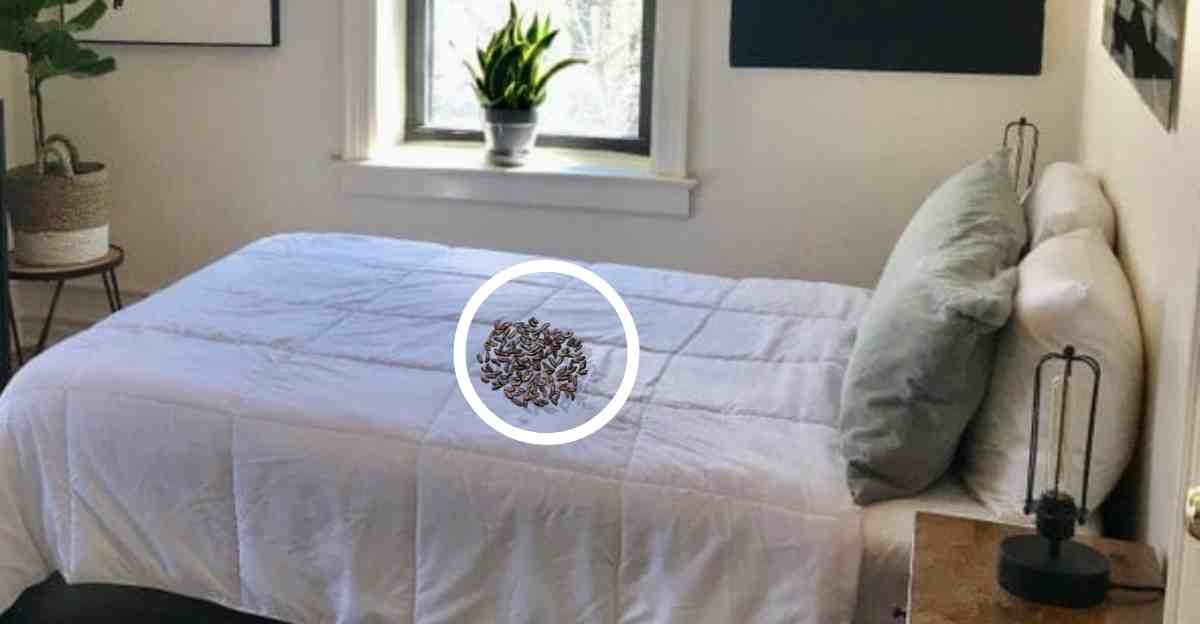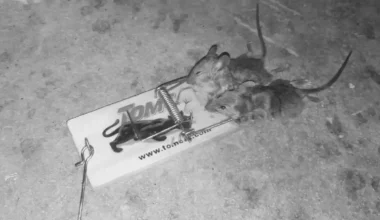Mouse droppings in bedroom can be irky. And the mouse could be determined to make your room inhospitable. When you find mouse droppings in your bedroom, you want to make sure it’s really from a mouse. Consider the following:
- Size: the length of a mouse dropping is about ¼ inch
- Color: Mouse droppings are usually black
- Shape: Mouse pellets are sausage-shaped
Regarding the quantity, mice can drop 40-100 pieces of poop daily. The more the quantity, the higher the level of infestation.
If you eventually find mouse droppings in your bed, you want to neatly wash and sanitize your bedroom to feel safe and comfortable in it. Mouse urine and droppings have a pungent smell and are carriers of a disease like Hantavirus. Symptoms of this virus start showing up after 1 to 8 weeks of exposure. Typical symptoms include:
- fever
- chills
- muscle aches
- headaches
- stomach pain
- a sensation of suffocation (as lungs fill with fluid)
- shortness of breath
There’s no reliable cure for Hantavirus and anyone can be infected irrespective of age. It’s thus important to avoid exposure.

Why would mice be in bedroom?
Mice are attracted to what they need to survive, especially food and shelter. You want to keep your bedroom clean at all times. Avoid eating in bed or cluttering your bedroom with unnecessary things to make your bedroom less attractive.
Mice are opportunistic feeders, so they are attracted to the smallest crumbs and leftovers in your bedroom. If possible, let all your foodstuffs be in the kitchen only. Do not pile up dirty clothes as mice can find comfort in them, leaving feces and urine in your room.
Look around your room for holes and openings where a mouse can easily penetrate. If there’s any, seal it.
Other reasons a mouse is in your bedroom are:
- the mouse has an active nest nearby
- it accidentally entered your bedroom
- there’s a mice infestation in your home
Where do I find mouse droppings in my bedroom?
You will find mouse droppings in your bedroom if you have food crumbs around or if your room is cluttered. Meanwhile, mice are generally shy beings, so they don’t operate in the middle of your living room (that’s not to say you can’t see a mouse suddenly darting across the room). Thus, when looking for the excrement, your main focus should be where these pests source for food, including any pantry cabinets or food stores in your room. Mice are common in these areas since they are good spots to cast their nest. So, if you spot any dark cylindrical droppings around these areas in your bedroom, you have a mouse indoors.
Below are a few more places to look out for mice signs and activity:
- cupboards
- along the skirting
- inside drawers
- appliances
- behind furnishings
- electrical wires
- the nearby garden next to your room
If you determine that the mice poop is new, it suggests an active infestation you want to deal with. It may be more helpful to contact a pest control expert.
What disease can you get from mouse poop?
Some of the diseases that mice droppings can carry include:
- Hantavirus. Spread by deer mice. Hantavirus infection comes from breathing in rodent urine and droppings.
- Leptospirosis. Caught when in direct contact with the urine of an infected mouse.
- Rat bite fever. Mice are also carriers of rat bite fever transmitted to humans through mice bite or scratch from an infected rodent.
- Salmonellosis. Transmitted through contaminated water from mouse urine and droppings.
- Lymphocytic Chorio-meningitis (LCM). LCM is mostly carried by house mice and transmitted to humans who come in contact with infected droppings or urine.
How to get rid of mouse droppings?
Having found mouse droppings in your bedroom, you want to properly remove them. Most importantly, avoid touching mouse poop with your hands uncovered. Mice poop, urine, and saliva can be vectors, so use heavy-duty, puncture-proof gloves when handling and disposing of the droppings. That said, follow these steps to protect yourself:
Allow air into the room
You need air passage for ventilation to get rid of possible diseases like hantavirus suspended in the air. This way, you don’t get to inhale the possibly contaminated dust.
Protect yourself
Put on a P-100/OSHA-Certified respirator and heavy-duty rubber gloves. Avoid breathing in contaminated mouse materials. Wash your clothes and linens with hot water and soap.
Get a cleaning solution
CDC recommends you use a preferred disinfectant. You can get any of these options:
- General-purpose household disinfectant cleaning product (the product must carry the word “disinfectant” on the label) or
- Bleach solution made with 1.5 cups of household bleach in 1 gallon of water (or 1 part bleach to 9 parts water), according to the CDC.
Make a bleach and water solution using 1.5 cups of bleach and spray it on all surfaces in your bedroom. Allow the solution to soak the area for at least 5 to 10 minutes. Never sweep or vacuum to avoid waking the particles that become airborne, which possibly increases your risk of mouse-borne infection.
Read also: could it be mice urine in the ceiling?
Clean the poop area/surfaces
Get clean, disposable towels to wipe your bedroom surfaces thoroughly. Take out items and dry or clean them as necessary.
Hantavirus cannot survive under ultraviolet light. Thus, you want to put affected items under the sun to dry for at least 30 minutes or wash fabrics in hot water. Make sure to dispose of all cleaning materials properly and disinfect your gloves before taking them off.
Cleaning after mice in bedroom
Fabric:
How do you remove mouse droppings from fabric? If your bedding, clothing, stuffed animals, etc., have been contaminated by mouse droppings in the bedroom, wash them using laundry detergent and hot water. If using a washing machine, set the water heat level higher.
If hand washing, wear rubber or latex gloves when handling the possibly contaminated items. Your dryer should preferably be set to 45℃ to inactivate hantaviruses.
Furniture:
If you find mice feces in your carpet or furniture, thoroughly wash them using a commercial steam cleaner, disinfectant, or a shampoo.
Books:
For documents and books, just wipe the mouse droppings off using disinfectant and a damp cloth soaked in warm or hot water. Dry the books directly in the sunlight. Under normal conditions, hantaviruses can stay active for up to 3 days. However, they become inactive after exposure to ultraviolet rays after about 30 minutes, depending on the heat.
Conclusion
If you keep seeing mouse droppings in your bedroom after several attempts to get rid of them, seek professional assistance from your local pest exterminator. Professionals are more likely to end the infestation quickly and more efficiently. They’d also safely clean the excrement and take measures to prevent mice from returning so fast.






